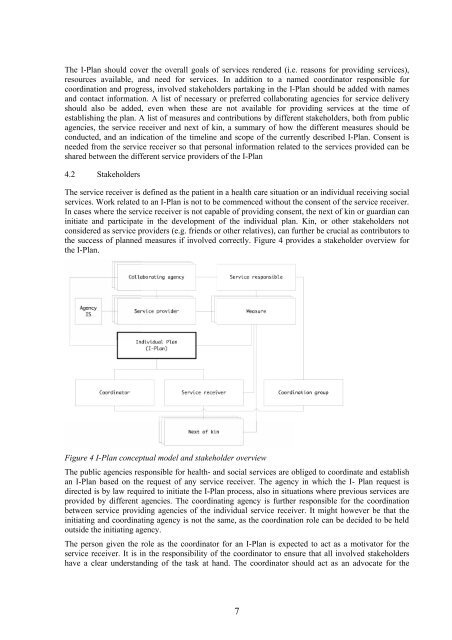Multi-channel provisioning of public services - Department of ...
Multi-channel provisioning of public services - Department of ...
Multi-channel provisioning of public services - Department of ...
You also want an ePaper? Increase the reach of your titles
YUMPU automatically turns print PDFs into web optimized ePapers that Google loves.
The I-Plan should cover the overall goals <strong>of</strong> <strong>services</strong> rendered (i.e. reasons for providing <strong>services</strong>),<br />
resources available, and need for <strong>services</strong>. In addition to a named coordinator responsible for<br />
coordination and progress, involved stakeholders partaking in the I-Plan should be added with names<br />
and contact information. A list <strong>of</strong> necessary or preferred collaborating agencies for service delivery<br />
should also be added, even when these are not available for providing <strong>services</strong> at the time <strong>of</strong><br />
establishing the plan. A list <strong>of</strong> measures and contributions by different stakeholders, both from <strong>public</strong><br />
agencies, the service receiver and next <strong>of</strong> kin, a summary <strong>of</strong> how the different measures should be<br />
conducted, and an indication <strong>of</strong> the timeline and scope <strong>of</strong> the currently described I-Plan. Consent is<br />
needed from the service receiver so that personal information related to the <strong>services</strong> provided can be<br />
shared between the different service providers <strong>of</strong> the I-Plan<br />
4.2 Stakeholders<br />
The service receiver is defined as the patient in a health care situation or an individual receiving social<br />
<strong>services</strong>. Work related to an I-Plan is not to be commenced without the consent <strong>of</strong> the service receiver.<br />
In cases where the service receiver is not capable <strong>of</strong> providing consent, the next <strong>of</strong> kin or guardian can<br />
initiate and participate in the development <strong>of</strong> the individual plan. Kin, or other stakeholders not<br />
considered as service providers (e.g. friends or other relatives), can further be crucial as contributors to<br />
the success <strong>of</strong> planned measures if involved correctly. Figure 4 provides a stakeholder overview for<br />
the I-Plan.<br />
Figure 4 I-Plan conceptual model and stakeholder overview<br />
The <strong>public</strong> agencies responsible for health- and social <strong>services</strong> are obliged to coordinate and establish<br />
an I-Plan based on the request <strong>of</strong> any service receiver. The agency in which the I- Plan request is<br />
directed is by law required to initiate the I-Plan process, also in situations where previous <strong>services</strong> are<br />
provided by different agencies. The coordinating agency is further responsible for the coordination<br />
between service providing agencies <strong>of</strong> the individual service receiver. It might however be that the<br />
initiating and coordinating agency is not the same, as the coordination role can be decided to be held<br />
outside the initiating agency.<br />
The person given the role as the coordinator for an I-Plan is expected to act as a motivator for the<br />
service receiver. It is in the responsibility <strong>of</strong> the coordinator to ensure that all involved stakeholders<br />
have a clear understanding <strong>of</strong> the task at hand. The coordinator should act as an advocate for the<br />
7
















